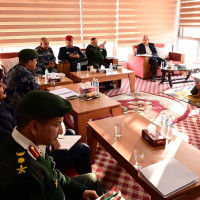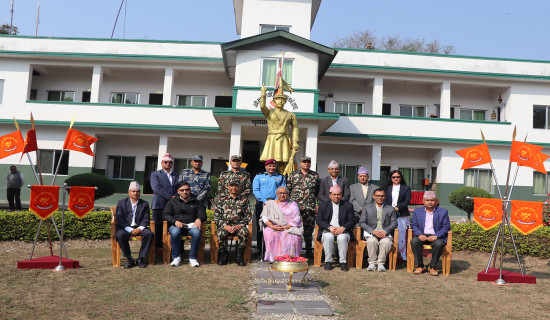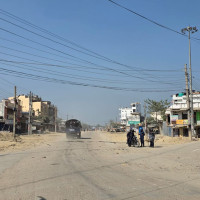- Sunday, 22 February 2026
Nepal's Constitutional Crossroads Ahead
It has been ten years since the constitution of the federal democratic republic was authored and enacted by the historic constituent assembly and promulgated by the first president of the Republic of Nepal, Ram Baran Yadav, in 2015. The constitution has been implemented for the last ten years, and two periodic elections have been held constructively for the three tiers of the government, including federal, provincial, and local. An array of democratic institutions has been created to implement the constitution's provisions. However, political leaders at the helm of affairs failed to work in tandem with the spirit of the constitution. Governmental instability resulting in the frequent changes of the government both at the federal and provincial levels, corrupt practices entrenched into the development projects, dysfunctional provincial governments, irresponsible and process-orientated bureaucracy, and poor service delivery – all these combined and conspired to make a mockery of federal governance, democracy, and constitutionalism in the country.
Political party apparatus and leadership converted themselves into the extractive machinery of the state, sucking resources of the public exchequer to fill their personal coffer, which was exposed when the mob ransacked their residences in the course of Gen-Z agitation. The apex leaders are found to have robbed the country in a very fraudulent way. It has been an ugly manifestation of fraudulent enrichment, tyranny, and kleptocracy as described by media commentators in the cases of African military dictators. All these had compounded to hitherto pent-up public discontent, anger, and disenchantment, which was crystallised into the civic fury and anger expressed through the Gen-Z movement during the previous week. The movement successfully delivered a blow to the corrupt class of political leaders.
This has evidenced that the democratic premises in the constitution failed to translate into real and actual delivery to the people. Political leadership and bureaucracy were unable to work in tandem with the democratic aspirations of citizens. In a sudden tectonic political turmoil, the Gen-Z movement forced the rulers to bow out of the office and ushered in the formation of a new civic government led by former chief justice Shushila Karki, who had been championing the cause of democracy, social justice and the democratic rights of the people in her long career as a senior lawyer and the chief justice of the country. After she retired from the position of chief justice, she kept her spirit alive, fighting for justice and the rights of the people. It is also for this reason that she was chosen to lead the new civic government through voting of citizen stakeholders, for which she polled a higher approval rating.
Needless to say, the federal constitution of Nepal, authored by the historic constituent assembly, epitomises democracy, constitutionalism, and subsidiarity principles in the term's limited sense. But it was not prescient enough to foresee the situation and respond to the crisis that befell the country during the previous week. When the existing government headed by the UML leader KP Sharma Oli was compelled to bow out of office, there was no explicit constitutional resort regarding which a new civic government could be formed to tackle the crisis in consonance with the demand of the Gen-Z movement. President of Nepal Ram Chandra Poudel took advice from the constitutional experts and used his own good conscience to appoint the new prime minister to lead the new civic Government (Nagarik Sarkar) to safeguard the interests of democracy, justice, and constitutionalism. Still, the discredited political party leaders had been objecting and raising the voices that the parliament should not be dismissed to avoid a constitutional vacuum. However, this was not agreeable to the protagonists of the new civic movement, and the president acted accordingly.
The interim prime minister, Shushila Karki, who is heading the transitional government, has expressed her commitment to hold the elections within six months and pass the baton of rule to the newly elected government. The ministers have expressed a similar commitment.
As the one known for her commitment to democratic values, constitutionalism, and integrity, the new prime minister's pronouncement that her caretaker government would hand over the mantle to the newly elected government in six months should be appreciated. However, elections held subservient to the provisions of the existing constitution without amendment to some of its provisions, especially related to the electoral system, would repeat the same vicious circle of political instability, corruption, and administrative fragility that engendered civic fury.
Though they are discredited and vilified for their poor performance and indulgence in corrupt practices, major political parties like Nepali Congress and UML, among others, have also agreed to the fact that the existing electoral arrangement stipulated in the constitution needs to be amended to ensure that the country is vested with political stability and policy continuity. As demanded by the Gen-Z movement and the need of the hour, the new civic government headed by Sushila Karki should initiate discussions to make necessary amendments to the constitution. Gen-Z leaders have called in no uncertain terms that the current parliamentary mode of governance should be changed in favor of a directly elected president, the executive head of the government, to ensure that the country has a stable democratic government to govern the country for at least five years without any destabilizing threats.
Though the present federal democratic constitution of Nepal is a historic charter whose framework reflects the aspirations of the diverse ethno-social groups of the people, it must be treated as a dynamic document flexible enough to respond to the evolving challenges in the country. It should not be sanctified as a rigid and inflexible document in safeguarding the constitution. The principal issue is safeguarding democracy, the rule of law, and constitutionalism. Constitutionalism, not the constitution as a document, must be upheld and safeguarded as a paramount value that should not be allowed to bend and compromise.
Constitutionalism needs to be discussed in the evolving context of the country. It is not merely the existence of a written constitution but the commitment to uphold the rule of law, the separation of powers, and the protection of fundamental rights, which is basically lacking in Nepal. Western thinkers from John Locke to Montesquieu and eastern constitutionalists like BR Ambedkar have emphasized that constitutionalism is the foundation of a free and stable democracy. The principle of constitutionalism rests upon the idea that law, values, and democratic practices must constrain power. Thinkers like John Locke had argued that political authority derives from the consent of the governed, and rulers must act within the boundaries of established law to protect life, liberty, and property. Arbitrary power is incompatible with freedom. Similarly, A.V. Dicey, a key proponent of the rule of law, stressed that no person, including those in government, is above the law. But in Nepal, rulers considered themselves above the constitution and failed to abide by the ground norm of constitutionalism. Jean-Jacques Rousseau acknowledged that legitimate authority must rest on a general will that respects collective freedom. Modern constitutional democracies embed these insights by codifying rights such as free speech, equality, and religious liberty, ensuring that democracy extends beyond majority decision-making to include respect for human dignity and recognition.
Constitutionalism is thus the very essence of democracy, which transforms the system from mere majority rule into a system of liberty, justice, and accountability. Democracy cannot survive without legal and institutional constraints on the absolute and unfettered use of power. Constitutionalism guarantees the rule of law, protects fundamental rights, separates powers, and preserves stability. Without it, democracy risks degenerating into authoritarianism or anarchy. In the prevailing context of Nepal, the new government should take initiatives to strengthen constitutionalism and policy stability while ensuring that the people's socio-economic rights are addressed through delivery. If the provisions in the constitution are any hindrances, they need to be amended through broad-based and elaborate deliberation.
(The author is presently associated with Policy Research Institute (PRI) as a senior research fellow. rijalmukti@gmail.com)
















